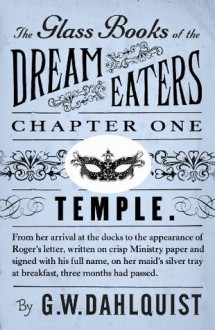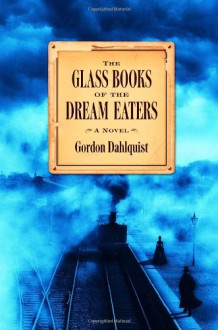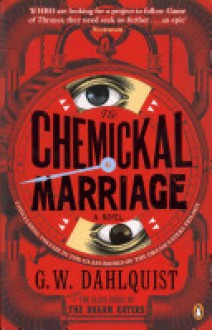
 Released in a serialised format, this is the first part of ten.
Released in a serialised format, this is the first part of ten.
It began with a simple note: a letter of rejection from Miss Temple’s fiancé, written on crisp Ministry paper and delivered on her maid’s silver tray. But for Miss Temple, Roger Bascombe’s cruel rejection will ignite a harrowing quest for answers, plunging her into a mystery as dizzying as a hall of mirrors—and a remote estate where danger abounds and all inhibitions are stripped bare.…Thus begins Gordon Dahlquist’s debut novel of Victorian suspense—at once a dazzling feast for the senses and a beguiling, erotic literary adventure.
Nothing could have prepared Miss Temple for where her pursuit of Roger Bascombe would take her—or for the shocking things she would find behind the closed doors of forbidding Harschmort Manor: men and women in provocative disguise, acts of licentiousness and violence, heroism and awakening. But she will also find two allies: Cardinal Chang, a brutal assassin with the heart of a poet, and a royal doctor named Svenson, at once fumbling and heroic—both of whom, like her, lost someone at Harschmort Manor. As the unlikely trio search for answers—hurtling them from elegant brothels to gaslit alleyways to shocking moments of self-discovery-- they are confronted by puzzles within puzzles. And the closer they get to the truth, the more their lives are in danger. For the conspiracy they face—an astonishing alchemy of science, perverted religion, and lust for power—is so terrifying as to be beyond belief.
In a novel that shatters conventions and seethes with danger and eroticism, Gordon Dahlquist has made a spectacular literary debut. And in Miss Temple he has created an unforgettable guide through a disturbing, seductive, and all-too-real world. By turns brutal and tender, shocking and deliciously romantic, The Glass Books of The Dream Eaters is a novel for the ages, a bold and brilliant work of the imagination
This book has three viewpoint characters,there is Celeste Temple the proper young lady,Cardinal Chang the assassin and Dr Svenson the man of doctoring and science.
Cardinal Chang first encounter Celeste on a train when she is covered in blood after going to the villains mansion to search for her fiancee to know why he vanished and broke it off so suddenly.I cant remember how the doctor enters the plot as he was pretty unmemorable and with all the other things you had to keep track of in this book you have to expect casualties.
So when I started reading this I had all my hopes up there would steampunk elements and good adventure throughout but I wasnt expecting all the eroticism that the backcover promises.
But when I first read it back in 2007 there was no mention of all that. So I guess it has been added later.
I dont have a trouble with sex in books I am not one of these people who only want "clean" reads but this one had me feeling a bit akward. In my head I thought of them as those awkward sexual scenes and made me wonder what purpose in bringing the plot forward they contributed to. There is a good reason the blurb of this book mentions "perverted religion" and "erotic literary adventure" because its a constant theme through the book.
The glass books of the title can be used to store a persons memories but it seems what most of them contain is memories of a sexual nature.I would have thought the technology could have some more practical use but then I am not part of twisted powerhungry cult who WANTS TO TAKE OVER THE WORLD.
And their evilest mastermind is a bi-sexual Contessa. :/
[spoiler]
she even sexually harass the female main character...but its not that bad-for it releases the repressed WOMANPOWER in her. Yes remember when the blurb promised an erotic literary adventure? Thats it. Some people in other books get awesome powers but not Celeste,she only gets the power of realizing that being touched against her will totally made her break free of her role as a proper young innocent victorian lady. Now shes unstoppable!
I was surprised she didnt burn her corset[/spoiler]
At least thats what I assumed they wanted to do as much of the book confused me.
I know this though...sometimes I felt like I was trapped in the authors sexual fantasy world.

The Glass Books trilogy concludes with the marvelous Chemickal Marriage. I loved this book just as I loved its two predecessors. Together, all three books make for a major achievement and I'm really looking forward to rereading them. I just wish they had the popular success that they deserve.
This poor novel debuted with no fanfare and was nearly impossible to locate in advance on - ugh - Amazon's search engine. Quite a far cry from the first novel in the series: The Glass Books of the Dream Eaters made it to the New York Times' bestseller list and Dahlquist was reportedly paid an advance of 2 million buckaroos. Clearly Bantam was capitalizing on the popularity of steampunk and had high hopes that Dahlquist's series would proved to be a lucrative bridge between literary and genre fiction. Just as clearly - and despite its brief bestseller status - it proved to be a disappointment. Reviews were mixed, the public was often confused and annoyed, and it did not achieve the far-reaching, sustained popularity that was expected. Sigh. Fickle public! Well I'm just happy that Dahlquist stuck to it and completed his series, despite his dwindling readership.
The plot of the trilogy, in brief (and this will be difficult because this is a joyously labyrinthine series): young heiress Celeste Temple, damaged assassin Cardinal Chang, and teutonic spy Doctor Svenson find themselves mixed up with various sinisters cabals who want to control the British government - and then the world! - through the use of bizarre blue glass books with many properties including the ability to transfer memories and personalities to and from individuals into and out of the glass books themselves.
The trilogy is, in a word, delicious. A rich, scrumptious, lavish meal. Celeste, Chang, and Svenson are compelling, amusing, sympathetic, and all too fallible protagonists. Sexuality is a constantly bubbling undercurrent. The Victorian setting is vividly described. The huge cast of villains and supporting characters are spicy and strongly rendered - particularly the chief antagonists, the deadly and brilliant Contessa di Lacquer-Sforza and the visionary, thoroughly repulsive Comte D'Orkancz. The dialogue is juicy, with many a condescending quip hurled from protagonist to antagonist and back again. The writing is top-notch; I can't actually think of another steampunk novel that operates at such a high level and whose prose truly impressed me. The pacing is breakneck - except for a chapter or two in the beginning of each novel devoted to giving the protagonists some breathing room to plot and plan - the narrative is always in motion, hurtling forward as characters run, hide, run, hide, jump on trains, get trapped on dirigibles, cross rooftops, and skulk, run, and hide in various mansions and government buildings. I suppose the excess of characters and schemes and locations can be exhausting to some; for me it amounted to a thrillingly immersive experience, one where I just had to let go, go with the flow, and not worry about the barrage of information and potential villains being thrown at me.
And best of all is a resoundingly proletariat perspective that constantly chafes at the inequities that arise from money and class. The novel spits on aristocrats and politicians and power brokers. The protagonists often spit on those types as well, literally. Love that!